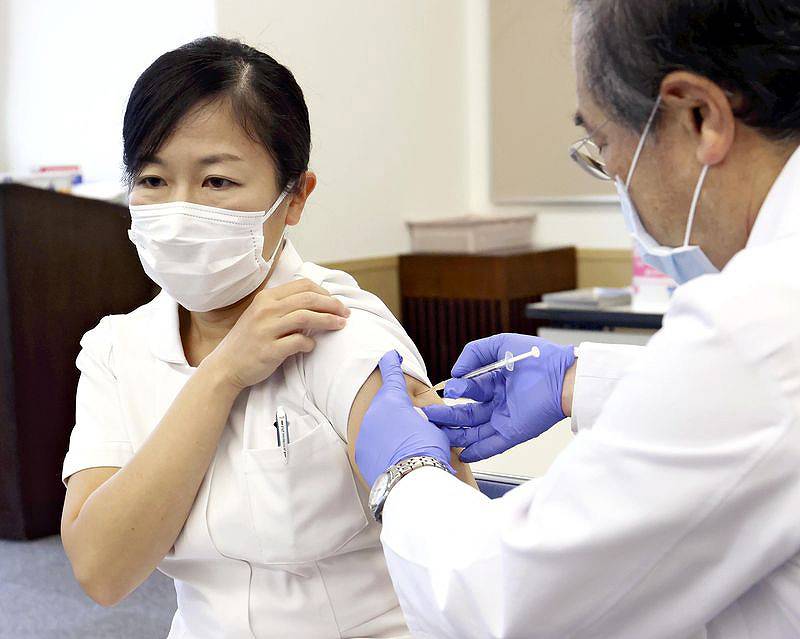
A health care worker receives a booster shot of Moderna Inc. vaccine at the Tokyo Medical Center in Meguro Ward, Tokyo, on Friday.
16:01 JST, December 18, 2021
The government plans to extend measures to strengthen border controls against the omicron variant of the novel coronavirus that are currently scheduled to expire at the end of the year, sources close to the government said.
Under the extended measures, the government will suspend the entry of nonresident foreigners from all countries and regions in principle. The government will make a careful decision on how long it will extend the period by monitoring the spread of the omicron variant, according to the sources.
The current border control measures were launched for one month on Nov. 30, when the omicron variant began to spread around the world.
All Japanese nationals returning from abroad are required to quarantine at accommodation facilities or at home for 14 days after entering Japan.
As of Thursday, returnees arriving from 48 countries and regions where omicron variant cases have been confirmed are required to stay at designated government facilities for three to 10 days after entering Japan.
The government has concluded that an extension of these measures is inevitable, with a Cabinet minister saying, “It has yet to be clarified from an epidemiological point of view what the omicron variant is, and thus we cannot ease the measures.”
According to the Health, Labor and Welfare Ministry, a total of 50 people had been infected with the omicron variant in the nation as of Friday. The government believes that it has been able to stop the spread of the variant in Japan through measures to strengthen border control.
The World Health Organization has said that the omicron variant is spreading “at an unprecedented rate” and is already present in most countries.
Prime Minister Fumio Kishida said at a session of the House of Councillors Budget Committee on Thursday, “We must continue to take a cautious approach until we reach a situation where the degree of risk can be predicted.”
Mix-match 3rd doses start
Mixing and matching of COVID-19 vaccination booster shots from a different manufacturer than the first two injections began Friday.
At the Tokyo Medical Center in Meguro Ward, Tokyo, 15 doctors and nurses who had received the first and second doses of vaccines manufactured by Pfizer Inc. were administered a third dose of vaccine made by Moderna Inc. on Friday.
The ministry granted special approval to use Pfizer’s vaccine for booster shots, followed by the same decision for Moderna’s vaccine on Thursday. Accordingly, people who received Pfizer’s vaccine for the first and second doses will be able to have Moderna’s vaccine for the third shot.
“Increasing the number of vaccine types available will lead to a stable supply of vaccines. We hope to accelerate the vaccination of the elderly in the future,” said Yukihiko Momiyama, director of the center.
A nurse in her 30s who received different vaccines for her initial and booster shots said, “Both vaccines have been approved after their safety was confirmed, so I don’t have to worry about them and can provide medical care with a sense of security.”
Top Articles in Society
-

Man Infected with Measles Reportedly Dined at Restaurant in Tokyo Station
-

Man Infected with Measles May Have Come in Contact with Many People in Tokyo, Went to Store, Restaurant Around When Symptoms Emerged
-

Woman with Measles Visited Hospital in Tokyo Multiple Times Before Being Diagnosed with Disease
-

Australian Woman Dies After Mishap on Ski Lift in Nagano Prefecture
-

Foreign Snowboarder in Serious Condition After Hanging in Midair from Chairlift in Nagano Prefecture
JN ACCESS RANKING
-

Japan PM Takaichi’s Cabinet Resigns en Masse
-

Japan Institute to Use Domestic Commercial Optical Lattice Clock to Set Japan Standard Time
-

Israeli Ambassador to Japan Speaks about Japan’s Role in the Reconstruction of Gaza
-

Man Infected with Measles Reportedly Dined at Restaurant in Tokyo Station
-

Videos Plagiarized, Reposted with False Subtitles Claiming ‘Ryukyu Belongs to China’; Anti-China False Information Also Posted in Japan





















